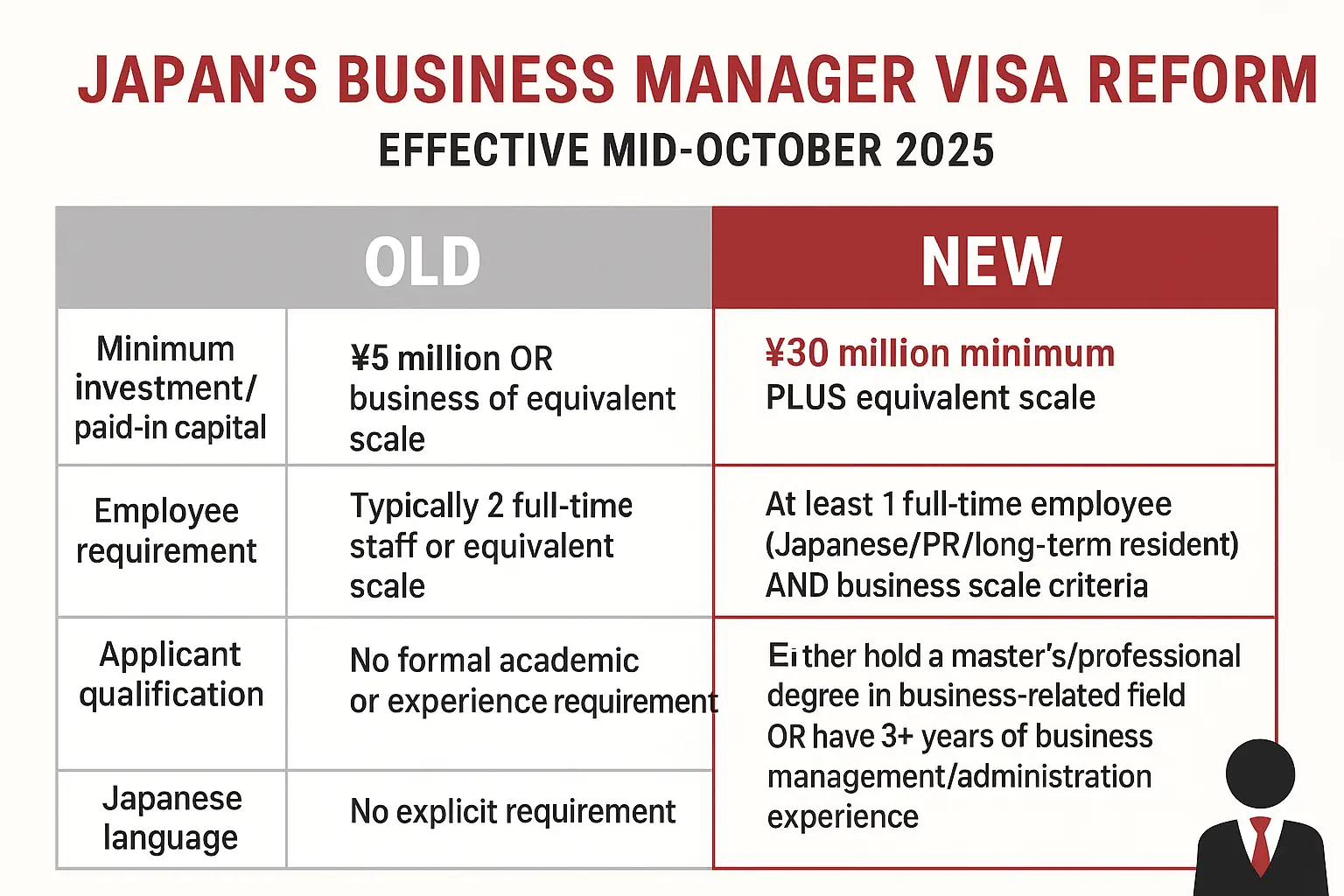Japan’s “Business Manager” residence status (経営・管理 visa) allows foreign nationals to live in Japan while operating a company, with possibilities for family dependents and long-term residency. However, from October 16, 2025, the Business Manager Visa will operate under significantly stricter rules. This article compares the old requirements versus the new regime, outlines who is affected, and offers practical advice.
🔍 What Are the Key Changes?
| Requirement | Old (Until 15Oct2025) | New (From 16Oct2025) |
|---|---|---|
| Minimum investment / paid-in capital | ¥5 million or business of equivalent scale | ¥30 million minimum (≈ US$200 k) PLUS equivalent scale |
| Employee requirement | Typically 2 full-time staff or equivalent scale | At least 1 full-time employee (Japanese/PR/long-term resident) AND business scale criteria |
| Applicant qualification | No formal academic or experience requirement | Must either hold a master’s/professional degree in business-related field or have 3+ years of business management/administration experience |
| Japanese language proficiency | No explicit requirement | Applicant or full-time employee must have “considerable” Japanese ability (e.g., JLPT N2 or equivalent) |
| Business plan & documentation | Standard review | Must be reviewed by a certified expert (SME consultant, CPA, etc.) and must show scale, office space, payroll, etc. |
Why the change?
These reforms aim to curb misuse of the visa as a backdoor to residency, ensuring that foreign-managed companies in Japan are substantively operating, employ locals, and contribute meaningfully to the economy.
🧮 Old vs New: What It Meant in Practical Terms
Before October 2025:
- Applicants could invest only ¥5 million (≈ US$33k) or hire 2 full-time staff.
- Many small foreign-owned businesses qualified, including small service firms.
- Renewal rules remained moderate, and the route to permanent residency (PR) after ~10 years was clearer.
From October 16, 2025 onwards:
- Investment threshold jumps sixfold to ¥30 million.
- Hiring one full-time employee is mandatory.
- Academic/experience requirement added.
- Japanese ability requirement is introduced.
- Renewal under the old rules may still be possible for a limited period (commonly till around 2028) for those already holding the visa.
👥 Who Is Affected?
New applicants:
From mid-October 2025, anyone applying must meet the new criteria. Many expect a surge of applications before the deadline as entrepreneurs aim to secure approval under the old regime.
Current visa‐holders:
If you already hold a Business Manager visa under the old rules, you can renew under those rules for a transitional period (often 3 years) before you must fully comply with the new criteria. Planning ahead is essential.
📝 Why This Matters — Key Implications
- The bar for entry is now much higher: only larger‐scale, more experienced entrepreneurs qualify.
- Small service providers, freelancers or startups with low investment may need to reconsider or pursue alternate visa routes (e.g., Startup Visa).
- Business viability, profitability, local hiring, and Japanese language competence become crucial.
- Delays: Applicants should build their business plan, raise capital, hire staff before applying. Rushing may lead to rejection.
📌 Practical Checklist for Applicants
✅ Raise paid-in capital to meet or exceed ¥30 million.
✅ Hire at least one eligible full-time employee in Japan.
✅ Prepare a business plan reviewed by a professional (CPA/SME consultant).
✅ Prove either a relevant graduate degree or 3+ years of management experience.
✅ Ensure that applicant or staff has strong Japanese ability if business operations require it.
✅ Secure appropriate office space, payroll records, local registrations, and accounting compliance.
✅ File application before the deadline if operating under old rules; else prepare for new rules.
🎯 Final Thoughts
The Japan Business Manager Visa reform from October 16, 2025 marks a major shift away from relatively low-barrier foreign entrepreneurship towards a more selective model centred on serious, well-capitalised ventures. If you were planning to launch a company in Japan under this visa type, now is the time to act decisively—but smartly.
If you don’t yet meet the criteria, consider the Startup Visa route which offers a preparatory period, or revisit your business scale and strategy.
Whatever path you choose, preparation is key—and the time to start is now.
Discover more from Ali in Japan
Subscribe to get the latest posts sent to your email.

